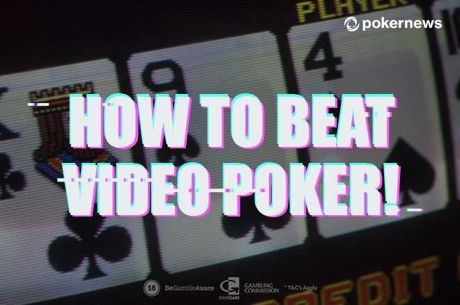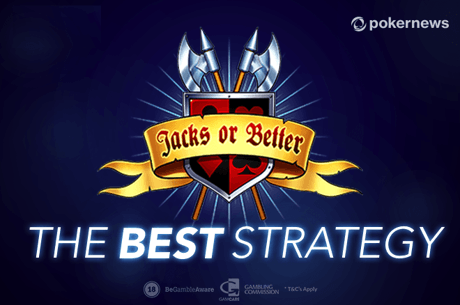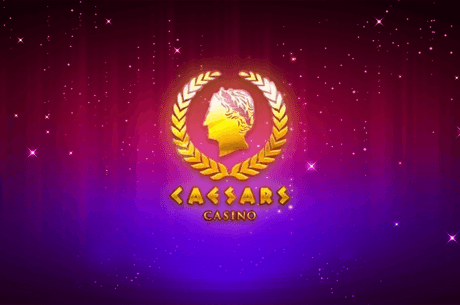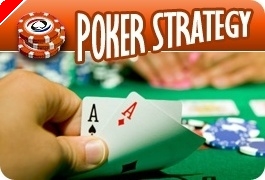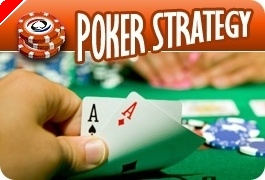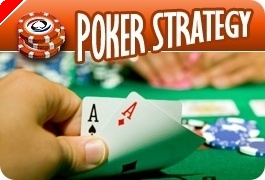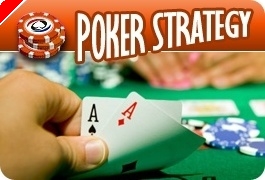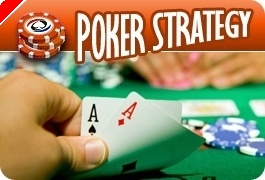Stud Poker Strategy: Dealing with Wild Men
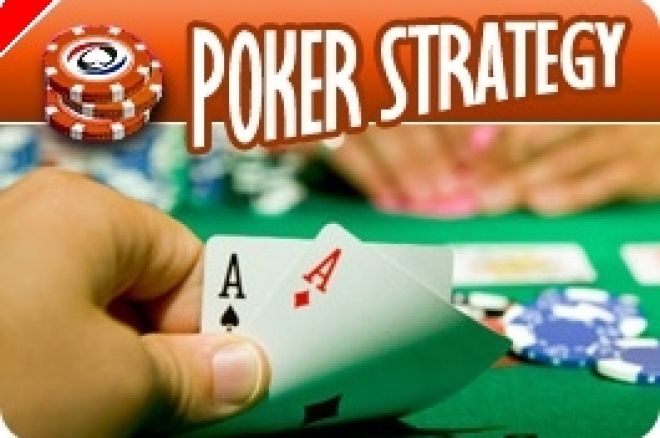
I'm the opposite of a wild man at the table. I pretty much play by the book. On third street, when I have a premium pair, I raise nearly all the time. If I think someone has a better pair and I have a better kicker, I call �C if my cards are live. If I have a three-flush I generally call on third street if I think that there will be at least a few other people calling with me.
As I said, my play tends to be pretty sedate �C though there are exceptions.
This strategy generally works well against people who play too loosely �C as most players do. I tend to be able to get a read on their hands based on how they bet �C and so I can take advantage of them �C by just playing cards that are superior to theirs. But sometimes someone comes to the table who plays very differently. Such was the case the other night.
As it turned out, it was Thanksgiving night. Foxwoods, where I normally play, was relatively quiet for a Thursday. There was only one $20/40 stud game going. There were two empty seats when I arrived at 9:00 PM.
I sat down to a conventional game of slightly aggressive and very loose players. Many hands just had four or five players calling the bring-in for $5. There would be no raise. Sometimes, one player or another would get a little frisky on third street and raise �C with or without a decent hand. Three or four other players, with as little as a single ace or two suited cards, would call. After third street, the high hand would usually bet and would be called to sixth street by a chaser going after a straight or flush or two pair or trips. On the river, there was often a double check �C as neither player wanted to push any small advantage he thought he had �C fearing that his hand might lose.
In such a game, the strategy is fairly simple. Start with stronger hands than your opponents. Push them until the river. Bet the river if you think you're still ahead. And win money. If you're on a drawing hand, make the draw if the implied odds justify it �C which they often do since you're frequently getting soft, multi-way action. There are few if any re-raises so it remains relatively cheap to see fifth street. And with all the money from the loose callers, you'll get rewarded nicely when your hand comes in.
I was following this strategy �C but unfortunately I was card dead for about three hours. I had unsuited hands like 257, 69J, and 48Q. Hand after hand. It got so bad that when I was dealt a singleton exposed ace and raised in early position, as a pure, unadulterated, bored-out-of-my-tree bluff, everyone folded �C the only time the third-street raiser got absolutely no action. Lucky me!
So I was pleased when a new player showed up. I figured, superstitiously, that maybe his entry into the game would change up the way the cards had been running, and somehow interfere with the negative card karma that I had been surrounded by. All silly superstitious mumbo jumbo I know �C but after three hours of dead cards I was even willing to resort to voodoo dolls.
The new player took complete control of the table, with near-maniacal raising. He wasn't drunk or loud, just relentlessly aggressive. Here is an example of his play:
A trey brought in the betting. The wild man, with a six, raised to $20. The player to his immediately left, with a J, called. A king, held by a very tight player, raised. The six, held by the wild man, re-raised. The jack, in the middle, called the double bet. The king capped it and the six and jack each called.
Fourth street brought the six a nine. The jack hit and ace and the king received a four. The jack, now headed by an ace, checked. The normally tight player with the king bet $20. The six raised to $40. The jack folded and the king re-raised. The six capped the betting. By the time the fifth-street cards were in the air there was already over $400 in the pot.
Fifth street and sixth street slowed down some. The king paired his four, bet, the six raised, and the king called. On sixth street the six paired his nine and the king hit a blank. The new pair of nines bet and the king with the pair of fours called.
On the river the wild man bet and the other guy called.. The pot stood at a little over $720.
I was dying to see what hands these guys had.
The tight player, who called, had kings up. This surprised me. Were I in his shoes I would not have been so aggressive, convinced that my opponent had a pair of aces on third street �C if not rolled up sixes. It turned out that he was much better at reading his opponent than I.
Keep in mind that this was the very first hand that the wild man was dealt. It set the image he had at the table for the next hour. He turned over just the pair of nines �C oh, and a flush that he caught on the last card.
He had a three-straight on third street which became a four-straight on fourth. He hit his four-flush when he paired his nines. He was betting insanely on the come the whole hand �C until the river.
The hand was indicative of what was to come. In the next forty minutes he pushed the action in all but two hands �C which he folded on fifth street when someone raised a bet in front of him.
Through all of this I had nothing �C absolute, unrefined drek. Though I was frustrated as hell at my inability to take advantage of the situation, I did have plenty of time to observe the table �C and think about what I was witnessing.
I realized that one player, who plays super-aggressively, can change the dynamics of the table. And the good player must respond accordingly by altering his own game.
Here are some of the strategy alterations that I have found need to be made to maximize wins and minimize losses when a wild man strikes.
1. Try to isolate.
You want to be heads-up with a super-aggressive player. If he is playing substandard hands you want to make sure that someone else doesn't sneak in and win with a hand that is better than yours and his. You do this by raising or re-raising the wild man �C making it two bets to other players. You have to be careful, of course, not to ignore signs of serious strength from other players. If, for example, they come over the top of you after you make a raise designed to isolate the wild man, you have to suspect that they are really loaded �C and you should often concede.
2. Recognize that the wild man raises with drawing hands or no hands �� and play accordingly.
The typical player will seldom raise with just a drawing hand on third or fourth street. But this player routinely does. If you fold to his raise, seeing strength when it isn't there, you will be missing many opportunities to win �C when you are in the lead. Don't be bullied by his aggression. Recognize that it may be no more than aggression for aggression's sake �C and stand your ground.
3. Use "anti-spin" against a maniac's aggression.
"Anti-spin" is a term from table tennis used to describe a special type of rubber that neutralizes the spin of an opponent �C with a rubber that itself doesn't impart spin. In poker, using anti-spin means to play passively back at a hyper-aggressive player. If he raises, even if you have a pretty strong hand, be less inclined to raise him (unless of course you are trying to isolate him). Be more inclined to play back softly at him �C checking into him and letting him lead the action. This is a defensive posture, to be sure �C a way of protecting yourself form the mammoth swings that may develop from a player who inflates the size of the game with constant, seemingly irrational raising.
4. Don't ignore the other players in the game.
It's tempting to get so caught up with your battle against the wild man that you forget that other players can catch strong hands as well. Keep your eye out for their aggression and their participation in hands when you're being aggressive. If your attempts to knock them out early with raises and re-raises fail, it may be best to play passively.
5. Draw less on early rounds with semi-strong hands even if the pot hasn't yet been raised.
Typically, in a loose and passive $20/40 game, if there are a couple of callers for the bring-in, it's unlikely that someone will raise the action. So you can play many hands for the $5 bet. But in a game with a certifiable madman, always popping the pot, you should be more cautious about this early call. Similarly, if you have a hand that warrants a call of a $20 completion on third, be wary of doing so if you don't want to also call another $20 or $40.
Let's say, for example, that you have a (6-A) 6 and a king raises in front of you. It isn't the wild man raising. And you suspect that he has a pair of kings. In some situations, where other players are likely to call behind you, it may make sense to call or even raise with the lower pair and the overcard kicker. But in this game, with a wild man waiting to toss in his re-raise, you probably don't want to enter the pot. The wild man may well raise the king �� and the king, looking to isolate the wild man, may well re-raise him. You have to ask yourself not whether you want to play your pair of sixes with an ace kicker (or similar hand) for $20 but for $60. The right move is usually to fold.
6. Call more late.
You will often be getting larger than normal pot odds, because of all of the action on third and fourth street. If you have a huge draw, a hand that is very likely to be the top hand in a showdown if it hits, it makes sense to draw to it �C even to a double bet and especially if the hand is still multi-way.
As it turned out, I never did catch a hand while the wild man was present. He left the table up over $2,000 in a little more than an hour. I hung around for a while, managed to win a couple of hands, and finished my night exactly even. Even so, the experience I gained was well worth the time observing.

